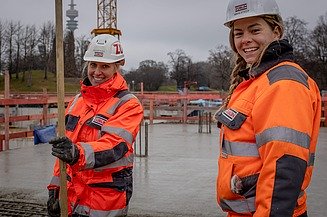Between career and family planning

What brought you to ZÜBLIN?
I was born in Hamburg, grew up in Berlin, graduated from high school in Essen and studied civil engineering in Aachen, graduating with a master's degree. A friend was working as a student trainee at Ed. Züblin at the time. He liked it and so I also applied and then joined Ed. Züblin myself as a working student in 2014. My parents and grandparents come from "construction". At first I wanted to go in a different direction and not work in construction at all, but study medicine. But I didn't want to sit out the many semesters I had to wait, so I started studying to become a civil engineer. I am very happy about that today. I've already been to Hamburg, Cologne and now Munich for the Group and worked on interesting projects there.
Is your job what you imagined it would be?
I already knew a lot about the construction industry through my parents. Especially during my time as a working student, I gained even deeper insights and thus a good idea of my profession. At the beginning, it was unusual to work exclusively with men and I had to defend my point of view. However, this was not only due to my gender, but also my age. I was much younger than many of my colleagues and co-workers. In fact, I had expected more women in my workplace. In my studies, the ratio of women to men was about 40% to 60%, if you include the industrial engineers, with whom we had most courses in common. In the pure civil engineering studies (which I did), the distribution was about 20% to 80%. I don't always find the ratio given in the overall study program (40/60) in my projects and stations in the group. Most of the time it is below that.
Where did you face hurdles just because of your gender?
There was a site manager at a subcontractor who seemed to have something against women in the construction industry and always went to my project manager instead of communicating with me directly. At some point, I brought this up with both said construction manager and my project manager. My project manager ensured clear roles and said, "I'm not in charge. Please contact Gesa." At some point, the site manager realized that he could only get ahead if he turned to me and that I was good at my job. In the end, he told my division manager that it had been wonderful working with me. Fortunately, that was the only hurdle I've experienced so far.
What do you like most about your job?
Communicating with people, being empathetic and working with people.
Do you have a goal?
Hopefully never to lose the fun of the job! Professionally, my next step is to become a project manager and then develop further along the line. Here I still see the hurdle of family planning. In this respect, women (and men, too!) need to be offered good opportunities to combine both: for example, through job sharing - also in construction and project management."
What do you wish for the future at STRABAG?
I am a big fan of driving digitization forward. I would like to see uniform standards and tools on how and if data is collected to work on a project. Currently, there are so many ways to do and capture everything. With every new project, new experiences and standards come together, and if everyone uses different tools and documentation, we start from scratch every time. That costs a lot of time and energy.
Another wish: In Hamburg I had few female colleagues in the technical function and here in Bavaria it is 50/50. My feeling in Hamburg was: Why do we hire so few women? Or rather, why don't we get women convinced to work in the project, i.e. outside on the construction site, but rather inside?
That's why I would like to see more visible events at universities that specialize in recruiting women. A friend of mine works at a consulting firm and they do women-only events at unis. According to him, that works very well.
Progress starts with you.
Are you looking for a new challenge, exciting tasks and would you like to actively shape the future? We offer you a wide range of prospects and development opportunities. Apply now at STRABAG and become part of the progress.
Find your job